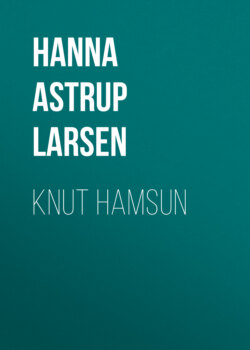Knut Hamsun

Реклама. ООО «ЛитРес», ИНН: 7719571260.
Оглавление
Hanna Astrup Larsen. Knut Hamsun
Knut Hamsun
Table of Contents
Portraits
THE WANDERER
EARLY LIFE IN NORWAY
FROM THE WHEATFIELDS TO THE FISHING BANKS
THE AUTHOR OF "HUNGER"
THE POET
HIS OWN HERO
THE HERO AND THE HEROINE
GOD IN NATURE
WITH MUTED STRINGS
THE LITERARY ARTIST
THE CITIZEN
HOLDING UP THE MIRROR TO HIS GENERATION
GROWTH OF THE SOIL
THE WANDERER ARRIVED
Knut Hamsun's Works
Transcriber's corrections
Отрывок из книги
Hanna Astrup Larsen
Published by Good Press, 2019
.....
Hamsun soon found that in order to make his living he would have to work hard under conditions more distasteful to him than his old roving life in Norway. For a while he cherished a hope that he might be able to make his way in some manner more suited to his mental equipment. He came under the influence of a Norwegian writer and clergyman, Kristoffer Janson, of Minneapolis, who tried to make a Unitarian minister of him. But the faith that tries to modernize religion by eliminating its mystery could not long hold the imagination of one who sees mystery as the very life and essence of religion. In the diatribes on American intellectual life published after his return to Norway he paid his respects to Unitarianism in an essay on Emerson. He cared little for the Concord philosopher. Of the American poets he "could bear to read" certain parts of Walt Whitman, Poe, and Hawthorne, while he referred to our most beloved poet as "the somnolent Longfellow." In Minneapolis he tried to express his unflattering views on American literature in lectures, and hired Dania Hall for the purpose, but Americans of Scandinavian extraction are extremely quick to resent any attack on their adopted country, and refused to listen to him.
When we remember how sober and well draped was the verse of our great New England poets, we can hardly wonder that it failed to satisfy the young author who, a few years later, was to lay bare every quivering nerve of his being in "Hunger." Nor can we wonder that a young immigrant, forced to work hard in rough surroundings, should not have discovered the finest flowers of American culture. It is more remarkable that he who was destined to write the great epic of the pioneer farmer in "Growth of the Soil" should have failed utterly to see the real elemental soundness and vigor of the pioneer community in which he found himself, and that he should never have had his eyes opened to the many obscure Isaks toiling on Norwegian farms in the Middle West. Yet this too can easily be understood when we remember how he thirsted for the richer, subtler life of an old community and how little his thirst had yet been satisfied.
.....